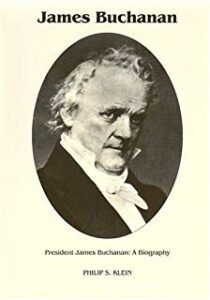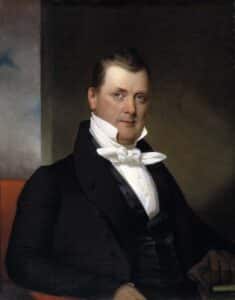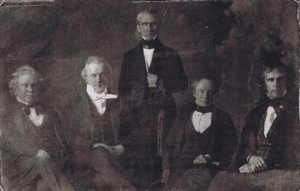Josh Reviews: President James Buchanan: A Biography by Philip Shriver Klein
 James Buchanan. Frequently called the worst American president in history, Klein argues that Buchanan’s only goal was union and a middle ground, and that history has remembered him poorly and unfairly. This biography certainly is not all that kind to the Republicans or to Lincoln in its last chapters. It is hard to talk positively about Buchanan, who became president at a time when the country was careening toward breakup. He was yet another “compromise” candidate that was meant to try to hold the crumbling sections together, and while that was possibly an impossible job, Buchanan’s actions weren’t calculated in a way that could have even possibly prevented what was coming.
James Buchanan. Frequently called the worst American president in history, Klein argues that Buchanan’s only goal was union and a middle ground, and that history has remembered him poorly and unfairly. This biography certainly is not all that kind to the Republicans or to Lincoln in its last chapters. It is hard to talk positively about Buchanan, who became president at a time when the country was careening toward breakup. He was yet another “compromise” candidate that was meant to try to hold the crumbling sections together, and while that was possibly an impossible job, Buchanan’s actions weren’t calculated in a way that could have even possibly prevented what was coming.
Philip Shriver Klein was a good scholar, and in his life wrote or co-wrote seven books, mostly about history related to Pennsylvania. He was the head of the History Department at Pennsylvania State University and the president of the Pennsylvania Historical Society. Buchanan, as the first of two American presidents to be born in Pennsylvania(Joe Biden was born in Scranton), is a sensible choice for his expertise. Published in 1962, the is the classic “go-to” biography, and probably the most comprehensive and scholarly of the limited choices you have if you’re looking for a Buchanan biography. It’s age does show, and it is more of a scholarly slog than an easy read, but I found it fairly readable.

At the end of this book, Klein says “his many talents, which in a quieter era might have gained for him a place among the great presidents of his country, were quickly overshadowed by the cataclysmic events of civil war.” Klein certainly argues this point to its base. I think that in a quieter time, Buchanan indeed may have been remembered as a better president (I think saying he would have been “among the great” presidents is probably a stretch). His steadfast belief in the constitution and his by-the-letter reading of the law and his options as president fit him as something of a Madisonian mold, someone unwilling to be a ‘strong’ president if it meant stepping on the holy ground of the constitution.
Unlike Klein, though, I am certain that Buchanan was the exact wrong man for the time. His intellectual bearing and firm, steady following of the law made him a laughing-stock of a president, a man who desperately hoped to solve the problem of slavery by doing exactly nothing about it. This was a course doomed to failure by 1856, and one that could only lead to ruin as he managed the Kansas situation with impeccable attention to rules but a great dearth of true leadership. Lincoln was exactly the president that Buchanan did not like – a ‘strong’ president who did step on the constitution, who suspended habeas corpus and made an aggressive war on the south (although Buchanan at least has the good sense to recognize that it was the South that started the war). The Democratic party believed that the issue was ‘agitation against slavery’ and chose strict constructionist views that erased ‘humanity’ from the equation of slavery, but in the long memory of history that put Buchanan and Pierce on the wrong side of history. Their attempts at appeasement, as Lincoln would surmise, were never going to work, and the south would simply expect more and more control to protect their ‘peculiar institution’.
Buchanan was not a bad man. He stuck to his principles like glue, and had a successful career in Pennsylvania and on the national scene. This book gave us a good look at the dumpster fire that was Pennsylvania politics, and the contradictory position it put Democrats like Buchanan in, half in Jackson’s camp and half out of it. Still, Buchanan served as secretary of State under Polk (although Klein gives him more credit than I would as to his behavior in the administration) and ably in England under Pierce (here he serves as a good means of understanding the hectic, shaky way that Pierce handled the presidency). Despite all of this, he did not make a good president, instead managing to upset everyone, lose his party support, and run into a wall in congress and domestic policy. Klein also gives Buchanan a lot of credit in securing an isthmian crossing and pacific trade, the same way that other writers did for both Pierce and Fillmore. I don’t really think any of them deserve it. They all tried but in the end failed to totally sift through the morass that was Central American politics in the 1850s.

The best light that I think Buchanan’s presidency can be viewed in is the one where we decide that he was the best option they had. There was no person who could win the presidency who did not try to steer a middle course, and by 1856 there was possibly no middle course that could have averted civil war. I believe that Buchanan, like weak presidents before him, believed in the union, the constitution, and America, but that he failed to provide the kind of leadership that could have prevented secession. But had Cass won in 1856, or Pierce, or Fillmore, or Fremont, it is difficult to believe that any of them would have prevented the war. As Buchanan argued in his later years, his actions during his presidency were eminently legal if ultimately also ineffective, and the civil war was brought on by much, much more than just his presidency. It is unfair to lay the blame all at his feet, when decades of growing bitterness (and the Kansas debacle, which had much to do with Pierce’s impolitic prejudices against abolitionists) had left Buchanan so few options.

